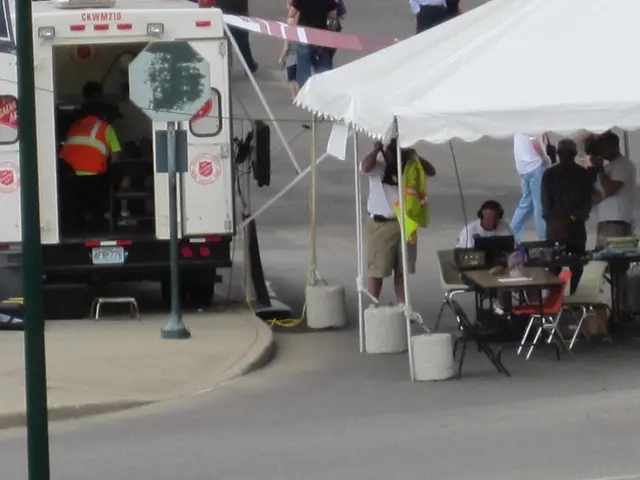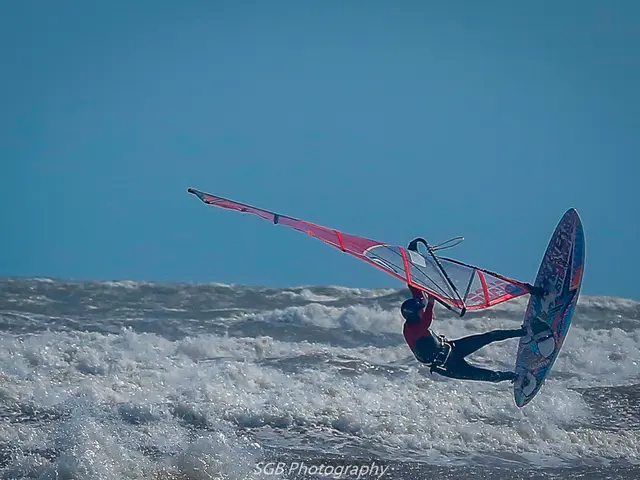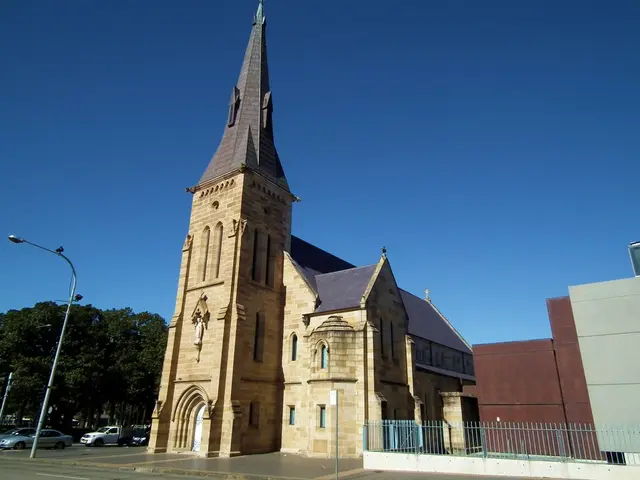Unleashing the 'Police State': Nadya Tolokonnikova's Chilling Prison Cell Performance
Tolokonnikova, creator of Pussy Riot, reappears at American museum within confining prison cell. - Return of Tolokonnikova to US Museum in Jail Cell Configuration
Get a glimpse of being under the boot of a "police state" without leaving your seat. Nadya Tolokonnikova, the 35-year-old co-founder of Pussy Riot, has set up camp in a razor-wire-adorned recreation of a Russian prison cell at the Museum of Contemporary Art (MOCA) in Los Angeles. This isn't just a stunt; it's an eye-opening installation running till June 14, 2025.
While you're here, Nadya does her bidding––eating, using the loo, even sewing clothes. The cell, complete with surveillance cameras and small viewing windows, allows visitors to keep a close eye on her every move.
Nadya hopes this replica prison cell, in the heart of the US, will mobilize people against the insidious threat of growing surveillance technology and the burgeoning "police states" across the globe. With her roots firmly entrenched in an authoritarian regime for over 25 years, she warns against the initial spark that sets the fire, often starting with just one arrest. Before long, she says, "the whole country is under military power."
Trump's return to the White House in January has sparked an alarming "erosion of the separation of powers," according to Nadya. With her performance, she calls on society to take a stand against misuse of power. "We can't sit back and watch," she says. "We all must help because nobody else will."
Worldwide, Pussy Riot shot to fame after a 2012 protest in Moscow's Christ the Savior Cathedral. Band members, including Nadya, were sentenced to prison for a "punk prayer" criticizing Kremlin leader Vladimir Putin. The group now resides in exile.
[Source: AFP]
The Nitty-Gritty
- Tolokonnikova's performance, titled "POLICE STATE," incorporates a soundscape of live music, prison noises, and various tracks. The cell is equipped with a pink toy piano, a synthesizer, and a laptop, enabling her to compose a unique piece that will be released at the end of the performance.
- The cell serves as a symbol of resilience against state power, embodying despair, defiance, silence, and radical acts of creation.
- The installation includes artwork from political prisoners, highlighting themes of oppression, resistance, and exposure.
- Surveillance elements like a guard tower and live feeds underscore the all-encompassing reach of control.
- The performance is a powerful commentary on the role and impact of power structures and the significance of resistance and artistic expression in the face of oppression.
[Enrichment Data: Nadya Tolokonnikova, Prison Cell, MOCA Los Angeles, AFP]
- Nadya Tolokonnikova, the pussy-riot founder, harnesses social-media to appeal for global attention, sharing updates about her performance, titled "POLICE STATE," at the Museum of Contemporary Art (MOCA) in Los Angeles, back to the prison cell she experienced in Russia.
- Despite imprisonment and exile, Tolokonnikova continues her fight against war-and-conflicts, using her platform to raise awareness about the burgeoning "police states" across the globe, back to the prison cell that represents resilience against state power.
- In addition to live music and prison noises, the performance features artwork from political prisoners, giving a voice to those silenced by oppression, back to the general-news covering Tolokonnikova's return to the US museum and her poignant reminder of the dangers of growing surveillance technology.
- The entertainment world has taken notice of Tolokonnikova's work, highlighting the interconnectedness of politics, crime-and-justice, and the arts, back to the call for people to stand against the misuse of power and the erosion of democratic values in the face of growing "police states."







